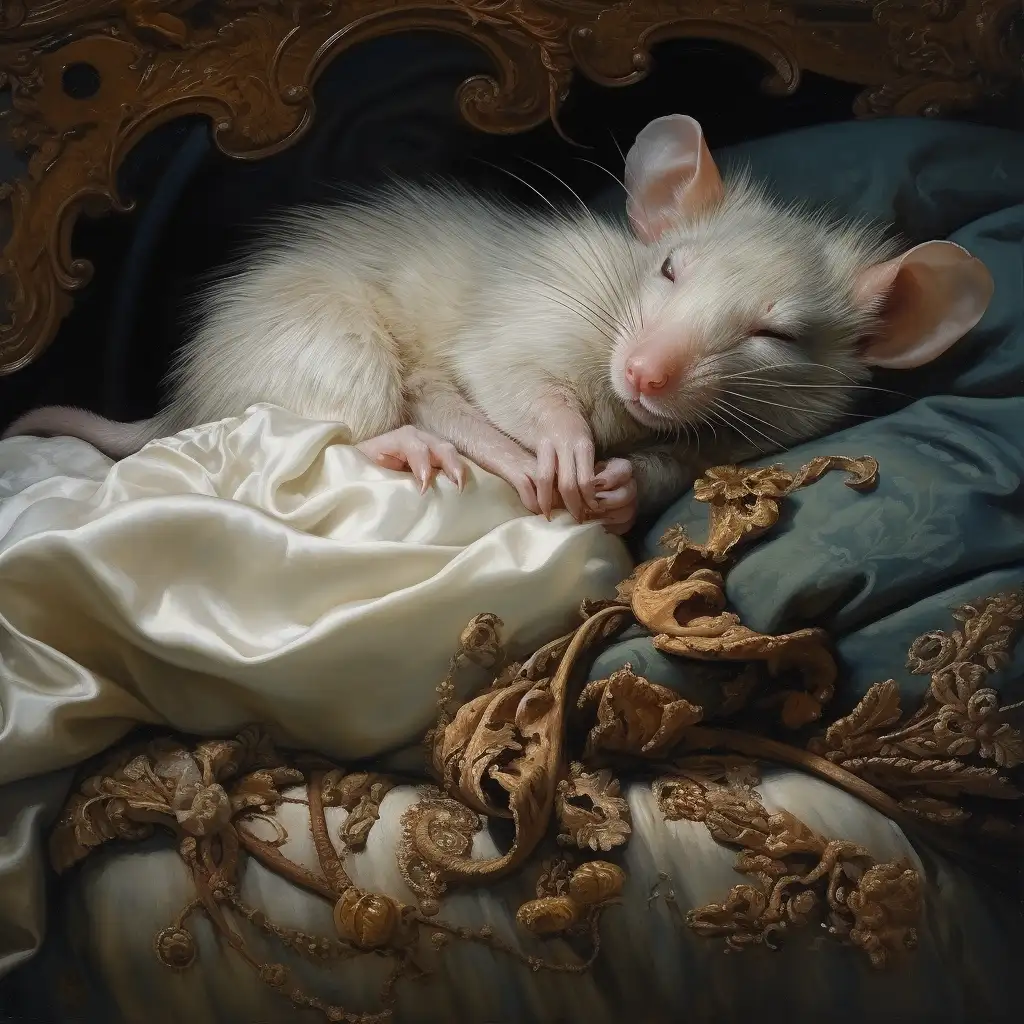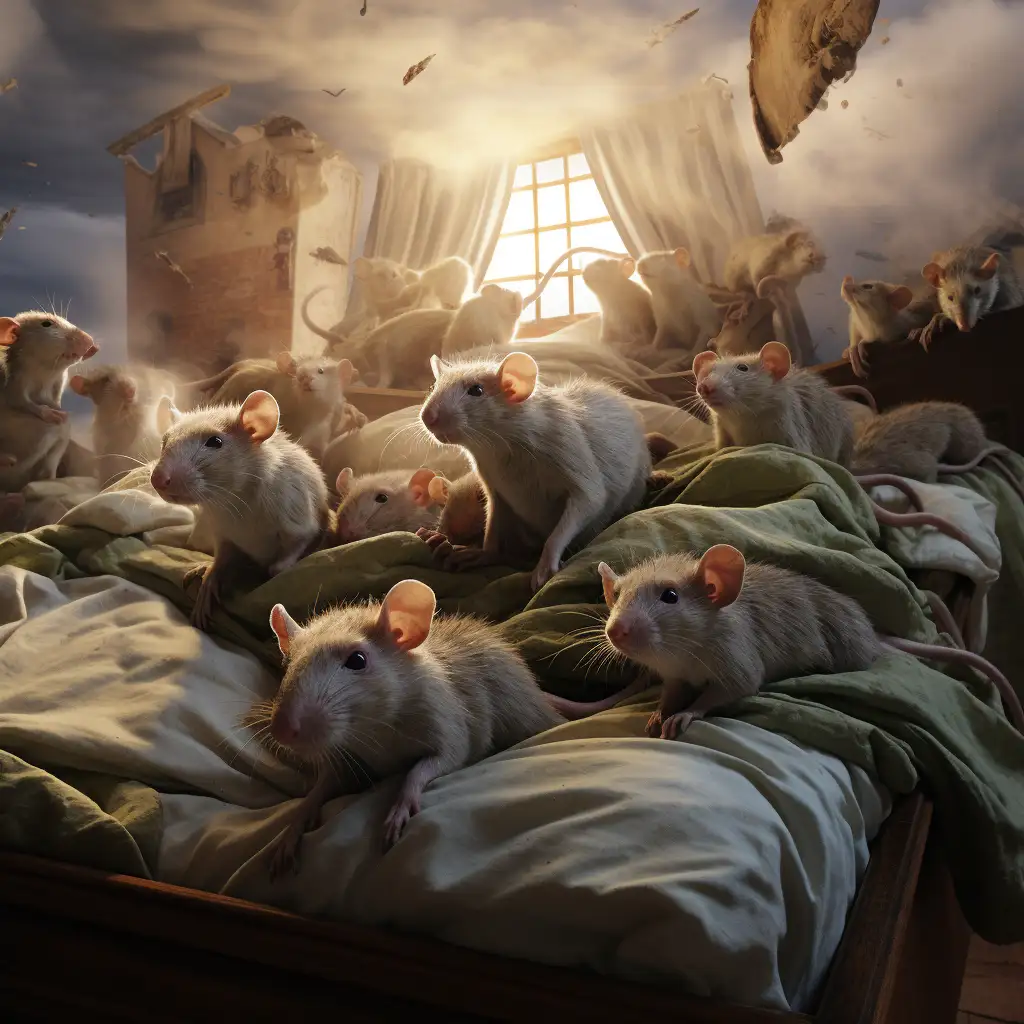Key Takeaways
2. Ancient cultures associated rats with wealth, cleverness, and resourcefulness, while the Middle Ages linked them to disease, death, and decay.
3. In modern times, rats are often seen as pests, but there is also a growing recognition of their positive attributes, as portrayed in pop culture.
4. Dream interpretation combines psychology, neuroscience, and personal reflection. Sigmund Freud emphasized the role of unconscious desires in dreams.
5. Dreaming about rats can evoke various emotions, such as fear, curiosity, or admiration. These emotions provide clues to the dream’s meaning.
6. Negative feelings associated with rats in dreams can mirror repelling or worrisome situations in waking life. It may signify feeling overwhelmed or facing challenges.
7. Rats in dreams can symbolize relationship dynamics, reflecting feelings of exploitation or being trapped in a relationship.
8. Occasionally, rats in dreams can serve as warnings about health concerns, drawing on their historical association with disease.
9. Personal context and experiences are crucial in dream analysis. Case studies illustrate how interpretations of rat dreams can differ based on individual circumstances and emotions.
Do you ever wake up from a dream, surprised at where your subconscious has traveled? That sense of curiosity is something we all share. Now, imagine the scene. You’re dreaming, and suddenly, a rat scuttles into the frame. Perhaps you’re intrigued or maybe you’re terrified. Either way, you’re probably wondering what it means to dream about rats.
The Cultural and Historical Context of Rats
Our perception of rats doesn’t simply spring from nowhere. In fact, it’s rooted in a variety of cultural and historical contexts. Let’s embark on a journey through time and across cultures to shed some light on the ever-changing symbolism of rats.
Ancient Symbolism of Rats
In ancient times, the symbolism of rats often swung between extremes. In some cultures, rats were held in high esteem. For instance, in Chinese culture, the rat is one of the 12 animals in the zodiac, associated with wealth and surplus. Those born in the Year of the Rat are considered to be clever, quick thinkers, and successful, embodying some of the positive characteristics we see in rats.
In Hindu tradition, the elephant-headed god Ganesha has a rat as a vehicle, symbolizing the deity’s ability to overcome anything to get where he needs to go. This further represents the rat’s resourcefulness and perseverance.
Rats in the Middle Ages and Early Modern Period
As we move into the Middle Ages, the symbolism of rats takes a dark turn in Europe. Rats became infamous as carriers of the Bubonic Plague, also known as the ‘Black Death’. In this context, rats were seen as harbingers of disease, death, and decay. The negative image of rats established in this period persists in many Western cultures even today.
Modern Perception of Rats
In today’s world, rats often bear the brunt of our disgust and fear. They’re frequently portrayed as pests or invaders in our urban spaces. However, there’s a growing recognition of their positive attributes as well. Their high adaptability, survival skills, and intelligence are well documented and admired, especially in scientific circles.
Rats have even become popular pets, valued for their sociability and cleverness. Pop culture too has had a role in this shift. Consider, for instance, the charming and talented rat chef Remy in Pixar’s “Ratatouille”.
The Psychology of Dream Interpretation
Dream interpretation is a fascinating field, merging the worlds of psychology, neuroscience, and personal reflection. It is an exploration of the inner self, a journey through our unconscious minds. Now, before we unravel what a rat may signify in your dream, let’s familiarize ourselves with the foundational principles and theories of dream interpretation.
Sigmund Freud and the Unconscious Desires
Sigmund Freud, the father of psychoanalysis, was a pioneer in dream interpretation. He theorized that our dreams are the “royal road to the unconscious”, serving as windows into our hidden desires and emotions. According to Freud, these dreams – whether about rats, flying, or a forgotten friend from the past – are driven by repressed longing or unresolved issues.
For example, if you were to dream about a rat, Freud might suggest this could be linked to suppressed fear or a hidden desire for survival or resilience, depending on your personal experiences and feelings associated with rats.
Carl Jung and the Collective Unconscious
Carl Jung, a student of Freud, developed his own influential theories about dreams. He proposed the idea of the “collective unconscious”, a realm of universal symbols or ‘archetypes’ shared across cultures and individuals.
In contrast to Freud, Jung viewed dreams not just as manifestations of personal unresolved issues, but as a broader tool for personal growth and self-realization. So, if a rat appeared in your dream, Jung might suggest that it represents an archetype related to survival, resourcefulness, or adaptability, again depending on your personal context and emotions associated with the dream.
Modern Approaches to Dream Interpretation
Modern psychology acknowledges the contributions of both Freud and Jung but also recognizes the role of cognitive processes in dreams. Dreams may act as a form of overnight therapy, helping us process emotions, solve problems, and consolidate memories. Thus, a rat in your dream could signify something that you are trying to work through or understand better in your waking life.

Interpreting Dreams About Rats
Dreaming about rats can invoke a range of emotions. Whether you feel fear, curiosity, or admiration, these emotions can provide significant clues about what the dream might mean. So, let’s venture into the possible interpretations of rats in our dreams, emphasizing the importance of personal context.
Rats and Negative Feelings
If a rat in your dream triggers feelings of fear, disgust, or anxiety, it’s worth exploring these emotions further. Rats, due to their historical and cultural associations with disease and decay, often mirror situations or emotions in your waking life that you find repelling or worrisome.
For instance, you might be dealing with a problem or a situation that you find overwhelming, akin to a rat infestation. Alternatively, you could be feeling ‘cornered’ or threatened, much like how you might feel if a rat suddenly crossed your path. These negative emotions tied to rats in dreams often encourage you to confront the unsettling issues in your life.
Rats as Symbols of Resilience
On the flip side, if you view rats through the lens of admiration for their survival instincts and adaptability, a rat in your dream might symbolize resilience. It might signify that you’re navigating through challenging times with determination, cleverness, and an unwavering will to survive.
Such a dream could be an affirmation of your own inner strength, reinforcing your belief in your ability to overcome obstacles. In other words, you might be the rat that’s surviving and thriving despite all odds.
Rats Reflecting Relationship Dynamics
In some cases, rats in dreams can also symbolize certain dynamics in your relationships. Are you feeling exploited or taken advantage of much like a rat gnawing away at your resources? Or are you feeling trapped in a relationship, similar to a rat caught in a trap?
Pay close attention to the behavior of the rat in your dream, as it could mirror your own actions or feelings in your interpersonal relationships.
Rats Indicating Health Concerns
Occasionally, rats might appear in dreams as warnings about health issues. This might stem from the rat’s historical association with disease. If the rat in your dream is sick or injured, it might be worth paying more attention to your own physical well-being.
Case Studies: Real Dreams, Real Interpretations
Let’s take our understanding of rat dreams a step further by exploring some real-life examples. This will help us see how personal context and emotions influence the interpretation of dreams.
Case Study 1: John and the Infestation
John had recurring dreams where his house was infested with rats, leaving him feeling terrified and disgusted. Upon reflection, he realized that the rat infestation in his dream was a symbol of his waking life. He was overwhelmed with responsibilities at work and felt as if his personal space was being ‘infested’ by stress and tasks that he found repulsive. In this case, the rats were a manifestation of his feelings of being overwhelmed and invaded.
Case Study 2: Maria and the Resourceful Rat
Maria, a single mother, had a dream about a rat cleverly escaping a maze. Unlike John, Maria did not associate rats with fear or disgust. Instead, she admired their resourcefulness and survival instincts. Upon waking, she realized that the rat escaping the maze was a symbol of her own life – navigating through the daily struggles and complexities with grit and determination. The dream rat was a reflection of Maria’s resilience and her ability to find her way, regardless of the obstacles in her path.
Case Study 3: Sam and the Biting Rat
Sam, who was going through a messy breakup, dreamed of a rat biting him. The bite was painful and caught him off guard, much like the emotional ‘bite’ of his deteriorating relationship. The rat and its bite symbolized the hurt he was feeling in his waking life, nudging him to confront and heal from the emotional pain of his breakup.
Case Study 4: Helen and the Sick Rat
Lastly, let’s consider Helen, who had been ignoring minor health issues for a while. She dreamt of a sick rat, which made her feel uneasy and worried. Upon reflection, she understood that the sick rat in her dream was a reflection of her own health that she had been neglecting. This dream served as a wake-up call for Helen to prioritize her well-being.
These case studies illustrate how our personal contexts, emotions, and experiences can shape the interpretation of rats in dreams. They show us that dream rats can symbolize anything from overwhelming responsibilities, personal resilience, emotional hurt, to health concerns. Remember, your dreams are personal to you, and understanding them requires introspection and reflection.

Practical Advice on Dream Analysis
Navigating the realm of dreams can sometimes be perplexing. However, there are strategies you can adopt to make the process of dream analysis more accessible and meaningful. Let’s explore how you can analyze your dreams more effectively.
Keeping a Dream Journal
One of the first steps to understanding your dreams is to remember them. Sounds simple, right? However, dreams can often be elusive, fading away soon after you wake up. That’s where a dream journal can help. Keeping a dream journal beside your bed and jotting down your dreams as soon as you wake up can capture the details while they are still fresh. Write down everything you remember – the symbols, the people, the emotions, the colors, even the smells. The richer your description, the more material you have for your dream analysis.
Consider Your Personal Context
Once you have a record of your dreams, the next step is to reflect on your personal context. Your feelings, experiences, and current life situation are critical guides to understand what a rat, or any symbol, means in your dream. For example, a rat in your dream will have a different meaning if you’re a scientist who works with rats in a lab, compared to someone who recently found rats in their attic. The interpretation of dreams is deeply personal, and your unique life experiences form the basis for your analysis.
Spotting Patterns in Your Dreams
As you continue to record and reflect on your dreams, you might begin to spot patterns. Perhaps rats often appear in your dreams when you’re stressed? Or maybe you dream of rats only in specific settings, like your childhood home? Identifying these patterns can provide additional insights into what your dreams are trying to tell you.
Seeking Professional Help
If your dreams cause distress, anxiety, or if you’re simply interested in a deeper understanding, don’t hesitate to reach out to a professional, like a psychologist or a trained dream analyst. They can provide additional insights, guide you through the interpretation process, and provide support if the content of your dreams is causing you discomfort.
Conclusion
As we wrap up, remember that dreams are a deeply personal and subjective experience. They are a rich tapestry woven from the threads of your own thoughts, emotions, experiences, and reactions. A rat might mean one thing to you and something entirely different to someone else. That’s the beauty and mystery of our dreaming minds.
FAQs
A: Dreams about rats can have various interpretations depending on the context and personal experiences of the dreamer. In general, rats in dreams are often associated with feelings of fear, anxiety, and negativity. However, their symbolism can vary, representing hidden fears, deceit, or even resourcefulness.
Q: Are dreams about rats always negative?
A: While rats in dreams are commonly associated with negative emotions, they don’t always have negative connotations. Sometimes, dreams featuring rats can symbolize adaptability, intelligence, or the need for resourcefulness in challenging situations.
Q: What do recurring dreams about rats indicate?
A: Recurring dreams about rats often suggest that there is an unresolved issue or persistent fear in the dreamer’s life. It may be beneficial to explore the underlying emotions or circumstances that trigger these dreams in order to address and resolve the recurring theme.
Q: Can the size or color of the rats in dreams affect their meaning?
A: Yes, the size and color of rats in dreams can add layers of interpretation. Larger rats may represent more significant challenges or fears, while smaller ones could symbolize minor issues. The color of the rats can also contribute to their meaning, as different colors carry different associations and emotions.
Q: How can I interpret my own rat dreams?
A: To interpret your rat dreams, start by analyzing the emotions and events in the dream. Consider any personal associations you have with rats and how they may apply to your current circumstances. Additionally, exploring common symbolic meanings of rats can provide further insight. Keeping a dream journal and reflecting on recurring themes can also help identify patterns and gain a deeper understanding of their significance.
Q: Are there any common dream symbols associated with rats?
A: Yes, certain dream symbols often appear in rat dreams, such as dark or dirty environments, traps or cages, or the presence of other animals. These symbols can provide additional clues to the interpretation of the dream and should be considered in conjunction with the presence of rats.
Q: Should I be worried if I frequently dream about rats?
A: Frequent dreams about rats do not necessarily indicate a cause for alarm. Dreams are highly personal and can be influenced by various factors. However, if these dreams consistently cause distress or impact your daily life negatively, it may be helpful to seek guidance from a professional, such as a therapist or dream analyst, who can offer support and insight.
Q: Can dreams about rats predict the future?
A: Dreams, including those about rats, are not considered reliable predictors of the future. They are typically reflections of the dreamer’s subconscious thoughts, emotions, and experiences. While they may offer insights or highlight underlying concerns, it is important to approach them as symbolic representations rather than literal forecasts.
Q: Are there any specific scenarios or actions involving rats in dreams that hold significance?
A: Yes, specific scenarios or actions involving rats in dreams can hold significance. For example, if you dream of being chased by a rat, it might indicate that you are avoiding or running away from a particular issue or fear in your waking life. On the other hand, if you dream of taming or befriending a rat, it could symbolize your ability to confront and overcome challenges or negative aspects of yourself.
Q: Can the presence of rats in dreams be related to real-life experiences?
A: Absolutely. Dreams often draw from our personal experiences and emotions. If you have encountered rats in your waking life or have a strong emotional reaction to them, it is possible that your dreams about rats may reflect these experiences. Exploring the connection between your real-life encounters with rats and your dream imagery can provide valuable insights into their meaning.
Q: Are there any other animals commonly paired with rats in dreams?
A: Yes, other animals are sometimes paired with rats in dreams, and their presence can influence the interpretation. For instance, if you dream of rats and cats together, it might symbolize a power struggle or conflict in your life. Rats and snakes appearing together could represent hidden dangers or deceitful individuals. Paying attention to the interactions between rats and other animals can deepen the understanding of your dream’s message.
Q: Can dreams about rats be related to relationships or trust issues?
A: Yes, dreams about rats can indeed be related to relationships and trust issues. Rats are often associated with betrayal and deceit. If you dream of rats in the context of a relationship, it may signify underlying trust issues, fears of being deceived, or concerns about the loyalty of others. Reflecting on your personal relationships and the dynamics within them can help uncover the specific meanings of rat dreams in this context.
Q: Is there any significance to the location where rat dreams take place?
A: Yes, the location where rat dreams take place can add meaning to the interpretation. For example, dreaming of rats in your home might suggest that you feel invaded or threatened in your personal life. Dreams of rats in a workplace could symbolize hidden rivalries, competition, or dissatisfaction in your professional environment. Considering the setting and its connection to your waking life can provide valuable insights into the dream’s significance.
Q: Can recurring rat dreams indicate unresolved fears or traumas?
A: Yes, recurring rat dreams can be indicative of unresolved fears or traumas. Dreams often serve as a way for the subconscious mind to process unresolved emotions and experiences. If you consistently dream about rats and feel a sense of unease or fear, it may be worthwhile to explore any underlying traumas or fears that could be contributing to these dreams. Seeking professional support can be beneficial in working through these issues.
Q: Can the emotions experienced during rat dreams affect their interpretation?
A: Absolutely. The emotions experienced during rat dreams can significantly influence their interpretation. Strong negative emotions like fear, disgust, or anxiety may suggest that the dream is highlighting unresolved fears or negative aspects of your life. Conversely, if you feel neutral or even positive emotions during a rat dream, it could signify resilience, adaptability, or a need for resourcefulness in challenging situations.
Q: Can dream symbols evolve and change their meaning over time?
A: Yes, dream symbols can evolve and change their meaning over time. Symbols in dreams are subjective and can be influenced by personal experiences, beliefs, and cultural context. As you grow and evolve as an individual, your interpretation of dream symbols may also shift. Therefore, it’s essential to remain open to new interpretations and consider how your personal journey and changing circumstances may impact the meaning of rat dreams and other symbols.







